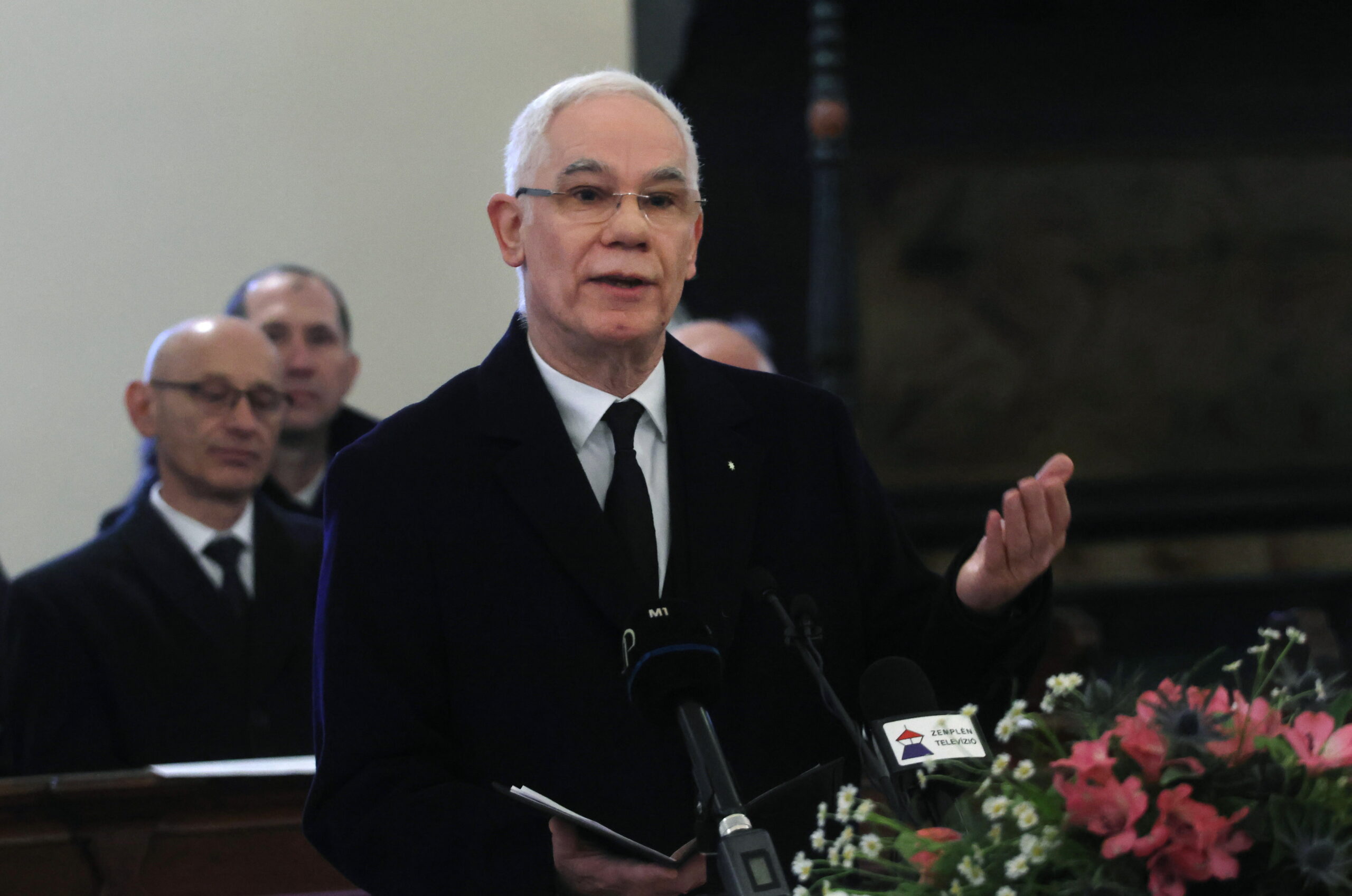In a recent blog post you write that when decision makers panic, market participants can begin to calm down. Are you any calmer after the rushed cancellation of the government's utility costs reduction program?
I didn't make that up, it's an old saying from the capital markets. In connection with almost all crises, one sees that decision-makers and politicians underestimate the probability of a crisis for a while, and then its depth - which is not a Hungarian phenomenon. Around 2007-2008, when the subprime mortgage crisis started, the US Federal Reserve first said that the crisis only applied to subprime (secondary mortgage) loans, which comprised only a small slice of the housing market, later acknowledging its effects upon the entire housing market, but from there it wouldn't spread any further. Eventually, everyone realized how serious the problem was. That's why it's important for those in charge of economic policy to become alarmed, because then they are willing to take the measures that can be used to stabilize the economy. And these are painful: in a crisis, every step that needs to be taken hurts someone. In Hungary, where politics has a very strong influence on the economy and upon bodies which make economic decisions, it is particularly difficult to implement measures that hurt the population or enterprise. For that reason, it's a comfort to me that the government is scared and is willing to touch the utility reductions program, because they have realized it's a serious problem and something needs to be done about it. This realization is also reflected in the Central Bank's measures, because we have not seen such high interest rates in a long time. Overall, the situation is more reassuring than it was three months ago, because it looks like they are recognizing the crisis and will deal with it.
Is the series of interest rate hikes and cancelation of the utility discounts enough to give you peace of mind?
Basically yes, because these are not the first steps. Special sectoral taxes and a total of HUF 2 trillion in austerity measures have already been introduced. It is true that the larger, expenditure-reducing part of that is not really visible yet - we'll believe the freezing of sections of the budget and the halt in investments when we see them - but HUF 2 trillion is a significant amount. The elimination of the utility reductions will obviously cost families hundreds of billions of forints, which is a heavy burden, but that step is important not only to put the budget in order, but also because the current account has been upset due to the rise in energy prices.
The utility costs measure - which should simply be called a gas price increase, because electricity is secondary and its price will not increase to such an extent - is also aimed at reducing consumption, as Hungary has to reduce the amount of foreign currency it pays for gas, because we simply do not have that much in foreign reserves.

And there's not as much gas as there has been up to now.
Yes, might say that this is a lucky coincidence, as we're forced to be frugal.
Does that mean we're saved?
I don't think the economic imbalance now is such that it could not be stabilized through meaningful intervention, if the government has the will to do so. I do not see that we are moving towards economic collapse. Unless some tragedy occurs, then this crisis can be handled through the previously announced measures from the government and Central Bank. Of course, I don't know what the price of gas will be in three months.
A peculiarity of the commodity markets is that if something is not available, its price has no bounds, which is the case for gas as it is indispensable. However, according to the models I have seen for supplying gas to Europe, the gas crisis looks to be manageable even if very little Russian gas is delivered.
What kind of crisis awaits us? Clearly, in response the government is using the war and the sanctions as an explanation, saying that if there were peace, then everything would be restored, considering that inflation was already stagnant last fall.
Rüdiger Dornbusch's description of populist economic policy in Latin America is also apt for Hungary. It is typical that following a crisis a populist force seizes power, and usually some positive economic boom assists in recovering from a crisis: that could be a really good harvest in an agricultural country, or when there's an oil discovery. In Hungary it was EU funds. Additionally, the economy moves like a pendulum: if investments are delayed for too long due to a crisis, they must be made. Moreover, in Hungary, after a 6-7 year economic slump, a positive shock came some time in 2012-2013 through a larger amount of EU funding, the recovery started, as a result of which tax revenues increased, the government was able to reduce taxes and implement investments, which caused the economy to expand even more, which grew public confidence, and people started to increase spending, so the country seemed less risky, thus interest rates fell, as did interest costs, and the government's room for maneuver expanded even more, and so on. At such times, during booms, one should pursue an anti-cyclical economic policy (smoothing out fluctuations in the economy, preventing a downturn caused by the next crisis - ed.), i.e. preparing for the more difficult years. But that's not what happens in most countries, not only in Latin America, but also in developing countries in general: rather, they push through whatever fits into the pipeline. Around 2017-2018, we in Hungary got to the point where the impact of external factors started to wear off, growth slowed, but the government tried to maintain it; since the election was forthcoming, it wanted real wage growth, which still mandated low interest rates, so it was possible to stimulate household consumption and corporate investments, and with the undervalued forint to continuously win on exports.
From 2018 at the latest, the government and Central Bank should have orchestrated a counter-cyclical economic policy, which would have resulted in a stronger forint, higher interest rates, and a smaller budget deficit - and that's not a smart aleck conclusion with the benefit of hindsight, as several economists had expressed that view at the time. At the same time, it may have been misleading that Hungary's domestic inflation indicators were not yet showing that the economy was overheating, because in essence they do not include the housing market, in contrast to the American inflation indicators, which roughly give it weight of 30 percent. If we were to calculate according to the American method, an inflation rate of 6-7 percent would have already been apparent at that time. This is how we got to the Covid epidemic and then the war in Ukraine. Latin American systems are also characterized by the fact that they are sustainable as long as there is no negative shock that uncovers weaknesses, such as the lack of reserves.
A devalued currency, low interest rates, wage increases, an undisciplined fiscal and monetary policy, the so-called "hyper-pressurized economy," which was popularized by Márton Nagy in our country, cannot be sustained forever - if it were not for the epidemic and the war, it would have ended within a few years due to some other shock effect.
And we stood with our pants down when the crisis hit, because as the famous investor Warren Buffett says, only when the tide goes out is it apparent who went into the water without swimming trunks.

At the beginning of the year, the government introduced a series of welfare measures, to the tune of HUF 1 trillion: a 13th monthly pension payment, personal income tax reimbursement for family members, half a year's worth of bonuses for police and those serving in the military and so on. Did they know then that they were going to swim naked, but the elections were forthcoming?
It could be debated whether it was in 2017 or in 2019 that it looked like something needed to change. There is no question, however, that in the second half of 2021 it was perfectly clear that the patronage planned by the government was completely unwarranted and should have been withdrawn, just as it was also clear that the utility reductions were not sustainable even with the gas prices at that time - many people wrote about this, including me at least three times. In the same way, monetary policy should have been tightened so that the exchange rate of the forint was not totally weakened, because although for a while the forint's devaluation did not raise the price of durable consumer goods, such as say, a refrigerator, a tipping point arrives when importers are in trouble due to a weak forint, and suddenly every one percent weakening of the forint is reflected in the price of cars or refrigerators.
Did the gas price start to rise last autumn due to the Russian-Ukrainian conflict? After all, for years before that, the Hungarian "utility-reduced" tariff had been above the market price.
Yes. Last year, we had a great debate with our colleagues when we saw the stock prices, and we didn't understand why the Russians weren't sending enough gas, but in retrospect it's clear that this was intentional - they were preparing for war, they wanted supplies to be able to blackmail Europe. Surprisingly, it didn't work out. I'm honestly amazed that the EU behaved so bravely. I was convinced that because of the virtually empty storage tanks and skyrocketing prices, they would be scared in the West and not stand up to the Russians, but it didn't happen like that. Of course, some governments could fall because of this.
Should residential prices already have been raised last fall? If for no other reason, so that a seven-fold price increase is not necessary?
Based on economic logic, it should have been raised, but that would have been political suicide on the part of the government.
The personal income tax reimbursement, 13th month pension and the other benefits, on the other hand, were obviously unsustainable when they were introduced. I also dared to write that after the election there should be a Bokros type of austerity package, which was perhaps an exaggeration, but we are slowly getting to the point where it's needed.
However, since people have vivid memories of the Bokros package, 27 years later we still measure the extent of austerity measures against it. What effects should we be prepared for in our everyday lives?
The gas price increase is set to increase inflation even more, according to MNB, by roughly 3 percentage points.
Meaning to a rate of over 15 percent.
This makes for a decrease in real wages for the vast majority of the population, even in the case of a double-digit wage increase. To put it simply, if I spend much more money than before on gas, I have less money left for other things. So the demand for services and consumer durables will decrease while simultaneously the government cuts back on investments. That's why it's bad if a government lacks reserves: it could compensate for a decrease in household consumption through investments, but it can't, because it has to save on those, too. We have seen many times in the last 30 years that everyone has to put on the brakes at the same time: the state, businesses and the population, and the effects of those curtailments reinforce each other. It is not yet known how deep the recession will be because of that, but economic growth already appears close to zero, and in the second half of the year it may even turn negative due to a decrease in real wages and because of the austerity measures.

In addition, the layers of the social crisis are stacked on top of each other: the gasoline price freeze has been limited, but will be maintained for private individuals until October; the interest rate freeze lasts until the end of the year - which means that almost every month there is some painful measure/ removal of government assistance.
The way economic populism works is that if there is an inconvenience, they try to overcome it through regulation: price caps, official prices, interest rate caps and so on. But when this becomes unsustainable and the cork must be removed from the bottle, there will be a deeper crisis than it would otherwise have been. Among the price caps, the cap on food items is negligible, but the effect of the fuel price cap is significant: as with gas imports, maintaining it will worsen the current balance of payments, and removing it will raise inflation more and reduce consumption.
The Latin American countries provide an apt example: the problem with price caps is that it is very difficult to eliminate them, because people get used to them, they distort the economy, and slow economic growth, so the long-term harmful economic and social consequences are much more serious than what can be gained through them in the short-term.
The gasoline price freeze was extended a month and a half ago, and meanwhile it is hard to imagine that raising the price of natural gas to interstellar levels beyond average consumption is the ideal situation for the government, as cheap transport fuel is provided to the population for months to come? Does this mean that even in mid-June, they didn't see how big the problem was, or did they know, but just didn't dare to cancel the fuel price cap so close to the elections?
It was evident from how things unfolded that the price cap should have been abolished. But as I see things, ad hoc decisions follow one after the other because there are too many issues to deal with: there are concurrent foreign policy and economic crises happening. So there's no need to seek out some great wisdom behind these decisions. Moreover, the official price of gasoline can be more easily maintained, since MOL bears the cost of this. The company's profits have increased significantly recently due to the fact that the price of Russian oil is much lower than that of Brent crude produced in the North Sea. MOL can easily pay this price at the moment, but the main problem is that consumption is not decreasing due to the price cap, so the current account balance is not improving, which puts pressure on the forint, and a fuel shortage develops. Incidentally, according to political textbooks: if austerity measures have to be made in a period close to elections, it is better to overcome the difficulty in the first phase of the political term.
We have already talked about conventional wisdom concluding that high inflation will end in high prices. We haven't seen inflation of over 10 percent in Hungary for 20 years. How long can it last, and how's it going to end?
There are pretty good experts at MNB, as there are in the market, dealing with inflation forecasting. But if you look at an inflation forecast from six months ago, it has nothing to do with what is happening now. This is not because the people who make them are stupid, but because the operation of the economy cannot be calculated beyond a certain point. There are regularities, but when economic systems change, for example, we go from a low-inflation, overheated economy to a double-digit inflation environment, completely different rules apply. And neither the Central Bank nor market analysts know these rules. The biggest question is how much the wage-price spiral will intensify.
The Central Bank is hoping, as I and everyone in the market are, that there will be an economic slowdown, which will reduce demand, a result of which people will not demand huge wage increases, because they are afraid of losing their jobs. In that way, the price of services will not have to be increased as much, so in the end, the rate of inflation slowly trickles back down.
The rate of inflation may drop temporarily, even to a few percent, if the price of imported products in the consumer shopping cart drops drastically, but I don't really see why inflation would drop below 5-6 percent, even within a year or two. Moreover, this is my optimistic scenario. The negative view is that due to the tight Hungarian labor market, wages will increase by 15-20 percent, which will lead to stable inflation of 10-15 percent.

So the market's best hope right now is that people will be worse off economically?
The market's best hope is that there will be no major wave of wage growth in the corporate sector. In a word, yes.
Because according to the market, this is the only way to stabilize the economy?
Yes. The problem is that not only do wage growth and the price of imported products fuel inflation, but it's also due to the fact that the forint has been devalued for years. This has also entered the public psyche: everyone knows that the forint depreciates every year. We got used to this back in the 1990s: at the beginning of the year there was a 15 percent average increase in prices, or a 10 percent wage increase, or vice versa. These can develop as things that occur naturally, but this cycle should be broken. Unfortunately, doing that involves economic pain.
You've written perhaps even more pessimistically about our growth prospects, contending that Hungary's options are limited because our labor market is stretched, that we'd only be able to grow with a high added value workforce, but you don't see where this could come from.
How to create a high-growth economy in the long term is obviously a debate for economics, which is a social science, it's not like physics. So anyone can say anything: myself as well. The problem that also occurs in the Latin American countries mentioned is that the governments carry out cyclical pump priming. They give a lot of cheap loans, build houses, stadiums and so on, but they do not invest in what determines growth in the long term: that's almost exclusively investments into human capital and infrastructure, including into the institutional system. The most important part of human capital to be developed is education, while the other is healthcare. I have an unsurprising observation: those things were not dealt with here in Hungary. In the absence of this, however, I do not consider it likely that Hungary's economic growth potential would have been any greater than in the last 10 years. In the last decade, the productivity of the labor force increased by only about 1 percent per year, and most domestic economic growth came from the fact that a lot of people entered the labor market, which is otherwise very good, since it is an important social goal for everyone to work. But when we can no longer attract new workers - and we can't, since there are no more - then this 1 percent growth is baked into the economy from here on. And that's very slim.
I have a strong concern that the last 10 years were good for Hungary, but we did not use that period to develop human capital in such a way as to lay a foundation for growth in the next 10 years.
I wonder why, Was it too expensive?
Politicians basically set very short-term goals. An investment in education pays for itself in 10-15 years. Four years is the maximum that a politician can shoot for, but often six months is preferred if popularity has to be maintained. Disrupting giant systems is politically very dangerous, and can lead to one's downfall, while the benefit only appears after 10-20 years. What politician is willing to take that chance? Only an idealist would initiate such a thing, but those are the ones with low chances of attaining power.
There is no more workforce, and the government does not want to import it from abroad, but it has not invested in human resources. So Hungary now doesn't have a plan B?
I don't see one in the long run.

And plan A? Can the current model run for a while longer?
In the event that European Union financial support is maintained, we can come away with an annual increase of 1-2 percent on average over the next 10 years. Wages grow a little, the economy grows a little, and there's no tragedy. But there is absolutely no catching up with Austria.
So, contrary to the government's hopes, we won't catch up with them by 2030?
I am 100 percent sure of that. I wish I didn't believe that.
Do you think there will be EU money available in the foreseeable future?
Half a year ago, the consensus on the capital markets was that the EU always reaches an agreement in the end. And now the prevailing opinion is that it is uncertain.
As an EU politician, it is difficult to imagine what one can ask Viktor Orbán to do, what one believes he will actually do and not undo two months later, while also facing pressure from voters to regulate Hungary's increasingly autocratic system. Personally, I see it as a sufficient guarantee for the EU, and thus a solution, if the European Public Prosecutor's Office is allowed into Hungary. Then maybe EU politicians will go easier on this in the end.

Meanwhile in Tusnádfürdő the Prime Minister said, amongst other things, that Hungary would be net contributors to the Union in the short term. That's something which could happen very quickly if we don't get money from Brussels while fulfilling our duties, but he probably meant that Hungary's high pace of growth, with the possible prospect of bringing some of the Western Balkans countries into the fold, would enable it to put in more money than it takes from the EU. Is this a feverish dream?
Anyone can say anything - I can dream too - but I don't think this is realistic at all. I already see it as impossible for the EU to accept candidates in the near future, since it's not capable of handling either Poland or Hungary. Still, EU accession is a success story both for our country and the Eastern European region: these countries are continuously converging towards the European average. The most successful ones, such as the Czech Republic or Estonia, have already arrived in practice. It is spectacular how these countries are getting closer to the EU average, but I don't think that we will soon become contributors - it just doesn't add up.
We have overtaken Portugal and Greece in terms of GDP. Will it be impossible to continue?
Overcoming the likes of Italy and Spain would be next. Doing that is very difficult, especially because, as I said, I do not see a possible source of growth. Hungary's biggest competitive advantage is that we keep the currency undervalued, and our workforce is very cheap.
Do we have human capital that is second to none in European terms, that we give away cheaply? If that doesn't exist, what is attractive about Hungary?
And if there is no agreement with the EU, there won't even be the 1-2 percent increase you mentioned?
The problem is not only that there is no growth, but also that it can lead to a very serious crisis. There is also a self-reinforcing process in the markets: if they see that Hungary has no financing, the forint weakens, and interest rates have to be raised, which increases the cost of public debt, resulting in a very deep recession if there is no agreement with the EU. There could be big trouble.
Is the agreement important primarily because of the incoming euros or because it strengthens faith in the Hungarian economy?
It's my conviction that the entire economy, including the capital market, is operating on the basis of trust. I see that capital flows are actually determined by belief in a story. Such a story may be true, having a basis in reality, or it may not be true, but it still works. And yes, that's why the EU agreement is very important, because if one doesn't occur, faith in Hungary will be lost, and then the forint, the interest rate market, the whole thing could fall apart. It is important to believe that this country will be financed by foreign markets and the population at the appropriate rate of return. In all developing countries, the biggest problems can arise when a capital bailout starts. And this is also a matter of faith, a matter of trust. For example, the lack of trust in the banking system is also self-reinforcing: if they start withdrawing money, the banking system collapses. In addition, we also need physical foreign currency, as MNB has quite a small foreign exchange reserve. Investments are necessary for supporting growth.
Far more personal savings have been put into government bonds than in the previous period: would the evaporation of these investors' confidence now pose a much greater threat to the Hungarian economy?
An even bigger one, since we are talking about HUF 10 trillion. That's a lot of money. Moreover, some of that is in a system similar to a checking account, so consumer financing could disappear particularly quickly, some of it even if expiring bonds are not renewed. So the role of the population has increased, which is fundamentally positive: it's one of the great success stories of recent years. Many people attack retail government bonds by saying that they are an expensive form of financing, but I agree with the government that it is better to rely on the public than on foreign investors, who turn their backs faster. Not to mention that if the population receives this type of interest income, they will certainly spend a part of it, it appears in the form of VAT or in some other way as income. In addition, it strengthens the citizenry and creates a wealthier class, meaning it also serves socio-political goals. So this is a great success story, which may be in jeopardy if there is no agreement. This could first create panic among foreign investors, but the Hungarians might follow them.
This seems to be a delicate balance: one would rather buy a government bond with an interest rate of over 10 percent than with a yield of 2 percent, but there may come a point where the construction seems dangerous, because interest rates are rising so much.
That's right, and again, it's a matter of faith.
What do you believe in at present?
Yikes. What do I believe in?
The question is posed in an economic sense, not a spiritual one. However, our interview is taking place in a room with a statue of a bull, not a bear.
We have one with a bear, too. The truth is, I've traded on a lot of markets, dealing with practically everything from Japanese government bonds to corn, and stocks. In every area I've seen stories that I didn't believe could happen. Having become skeptical, I'm able to imagine every system collapsing. I have a hard time believing in anything, but I can have hope.
I'm hoping, as I see from the signs, that the government has realized that there is a serious crisis requiring measures and an EU agreement. If those things happen, the Hungarian economy can be stabilized, even if at a painful price. I'm not sure I believe that, but I sure hope so.
















